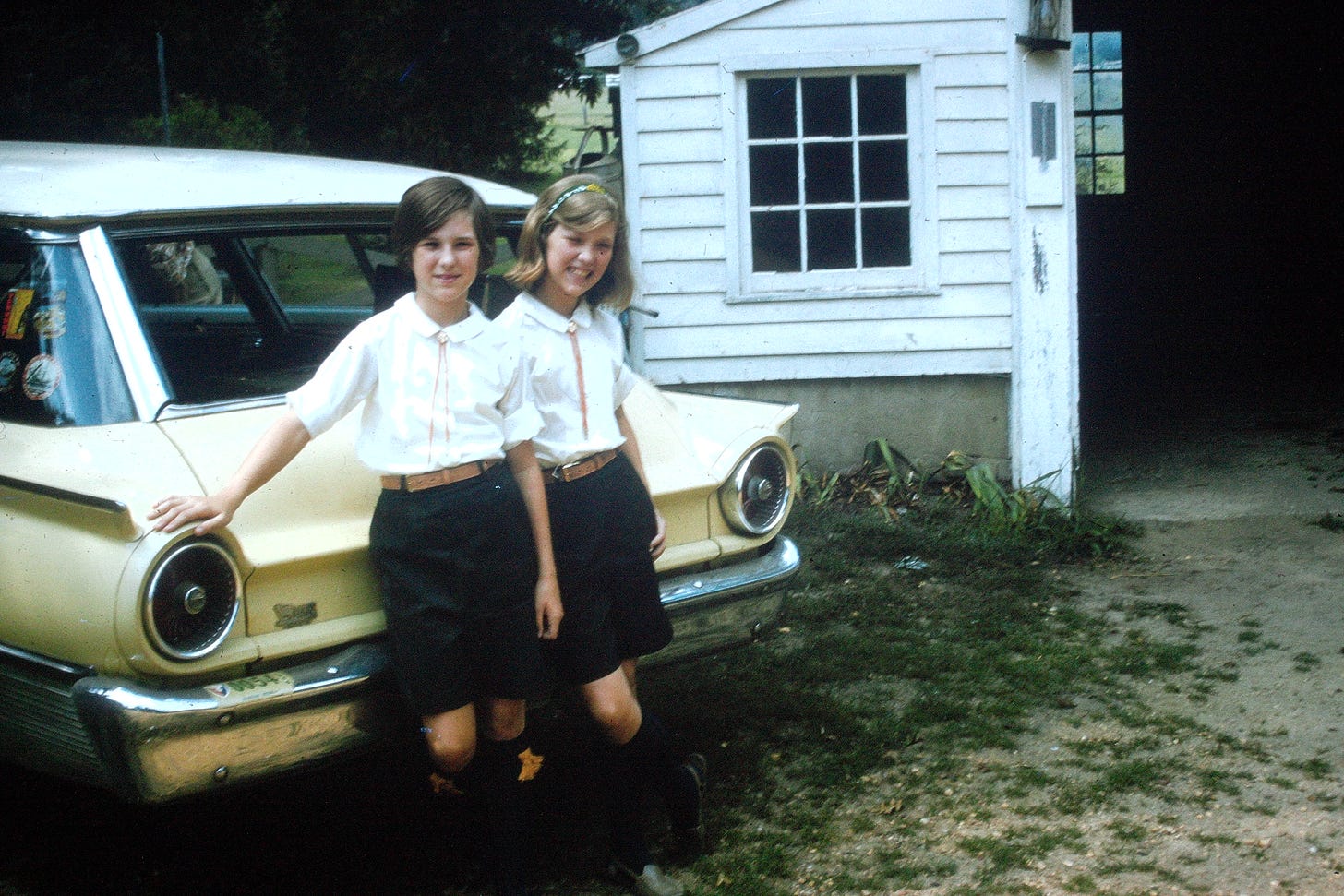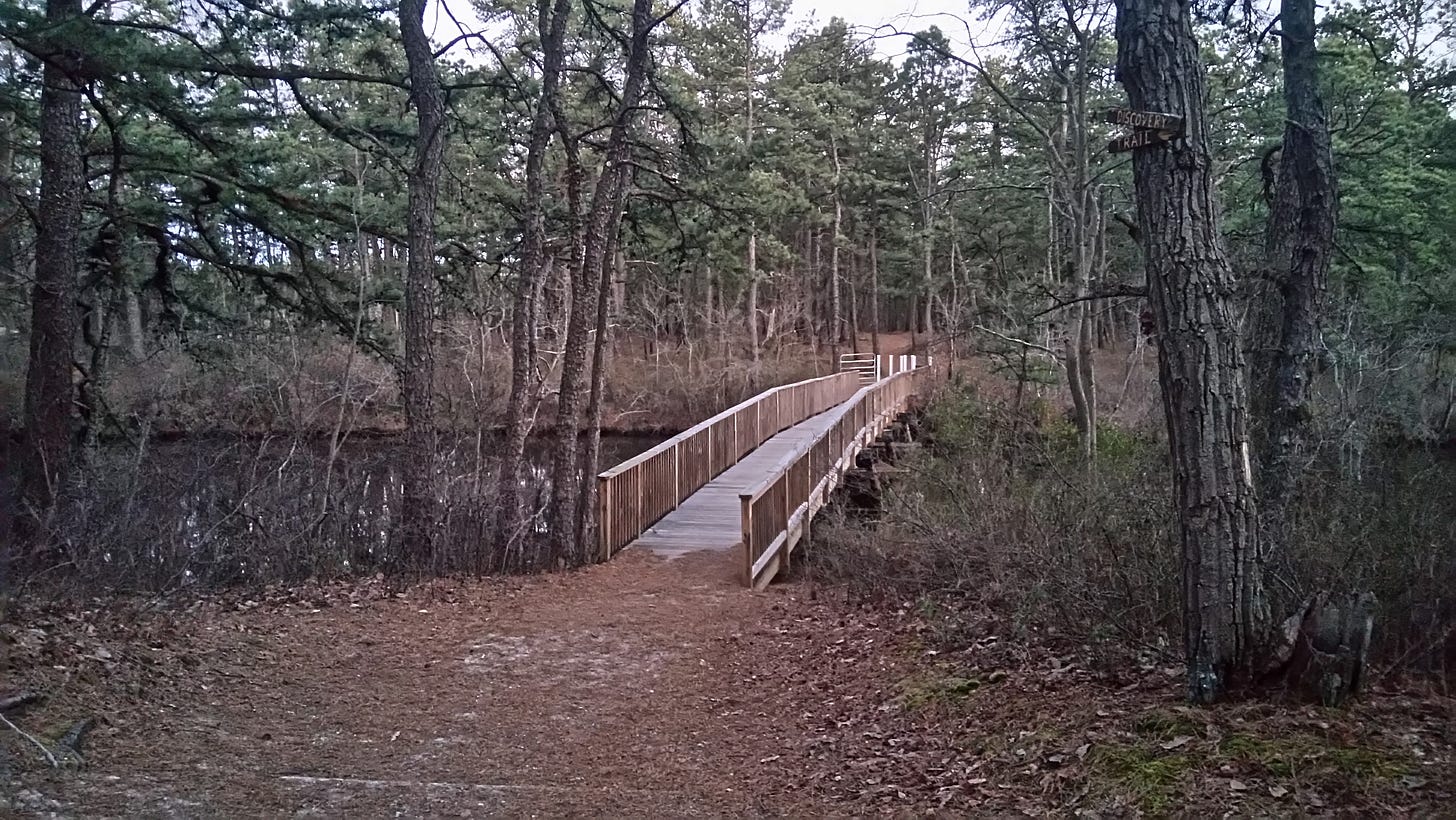Twice I’ve driven down the road called “Kettle Run Road.” At the end there’s a camp, but it’s a Christian camp, and it looks only vaguely like Camp Kettle Run and I feel pretty sure it can’t be the same place, even five decades on. Roads would have had to be built where there were none.
Just as I’m snooping around the gated and locked property, Sue texts me. She’s at work back in Kentucky, but that never stops her from texting and Facebook scrolling.
“What are you doing? How’s NJ?”
Just seeing her number come up sends a jolt of anxiety through my chest.
“Fine, I’m looking for our Girl Scout Camp,” I text back.
It’s always a risk sending a response because it triggers an onslaught of texts. Still, to ignore her will result in a passive-aggressive comment like, “Why don’t you ever answer me?”
A few minutes later, she replies. She has googled Camp Kettle Run and sent the address. It’s eleven minutes away. Not on Kettle Run Road at all. Since it hadn’t come up on my GPS, I didn’t think of googling it.
“Let me know if you find it,” she texts. This time I don’t answer. Once I read that twins often have an intense need for privacy and space because they were so crowded in utero. Doesn’t seem to apply to Sue, but maybe she took up all the room. I stayed in my mother’s womb for thirteen minutes after she was born, maybe luxuriating in having the space to myself
The Pine Barrens of South Jersey are an ecologically unique area, covered with pin oaks and scrub pines, dense undergrowth and orchids that grow nowhere else in the world. Its sandy soil overlays a deep aquifer of clean, clear water. It also never freezes, which is why it was a perfect burial ground for the mafioso. It’s one million acres and takes up more than half of South Jersey. It’s cut through by a warren of sandy roads on which people regularly get lost. Some die in there. Its ecosystem is maintained by fire.
The roads to the camp feel completely unfamiliar, but then I have never driven there, except for the one time I tried to take Jimmy and was told no boys were allowed when camp was in session. I don’t recall how I got the address then. Most likely, a phone book and a map.
Jimmy was Sue’s son, born when we were nineteen. I often had him for days and weeks as a young boy, and in high school, he came to live with me for two years after he’d moved back to be with her and she and her then-husband used the money he was sent by his father to get high. I wanted him to see where his mom and I went to camp. He was about six, but the “No boys” rule was firm.
There’s a closed gate at the entry, the long drive along the lake I recall so well. The drive signaled both our excited arrival and our tired but fulfilled departure. I park the car and go through a little pedestrian turnstile. It tells me that it’s okay to take a walk here, but vehicles are prohibited.
Still, I feel like a trespasser. I’m walking into my own past. As I approach the parking area, a crude sign, painted on a board tacked to a tree, points to the units and to Stokes Cottage, the Admin Building/Infirmary. Everything is as it was. I stand and take it in.
My body knows this place.
It knows which path will lead to the swimming docks, how I would go to get to the units I stayed in fifty years ago, that tree over there, where I sat after meals in the dining hall and whispered secrets with Sandy Parker, the flag circle, the campfire area, the showers.
I keep walking, pulled into my own history.
Before I got out of the car, I texted Sue. “I found it! I’m going in.”
“ Be careful… you are brave,” she writes.
No, I think, as I suddenly recall that I left my car unlocked. No bravery required here. There isn’t anyone here, but if there were, I’d tell them why I came. It must happen often.
What takes courage is to go into the places you lived and breathed, ate and slept and walked and sang and hugged and loved, and find there what made you who you are.
This place, and I feel this as I walk up the long drive, sheltered by pines, carpeted with the slightly gray sugar-soft sand of the Pine Barrens, the dark water of the lake to my left, the sound of rushing into a spillway, a runoff pond to my right.. this was a sanctuary.
Here for a week, and later, two weeks, we could leave behind the unnamed but ever-present tension of home. The tyranny of alcoholism, subtle though it may have been, sexual abuse, unnamed though it was, and the secrets that slunk around the crevices and corners of rooms, threatening to come out and begging to be told.
Here, I felt normal. I felt like a kid. The giggles in our tents late at night, the silly pranks, the camaraderie; perhaps most of all, living all that time out of doors was a healing that carried me through many months. Dreaming of it, planning for it, and talking about it with Sue was a great preoccupation.
Around March every year, the registration forms arrive. Included was a checklist, which we went over and over: Underwear, 6 pairs; 6 pairs of socks; swimsuit, towel; sunscreen; soap; camp uniform to wear for dinner and ceremonies; mosquito spray. These mundane items assumed a mythical significance as we imagined the tents, on raised platforms, our new, shiny trunks pushed under the cots, and our mosquito nets secured above.
Let’s talk about camp.
Lying in our twin beds, we’d begin.
And we’d go over the names and nicknames of the counselors: Bunny, Ro, Pat, Micky … the songs: Softly falls the light of day, as each campfire fades away. Silently each Scout should ask, have I done my daily task? the stories from the summers past: “Remember when Connie Blue sleepwalked right into the lake and got seaweed in her mouth?” “Remember when we short-sheeted the bed and then locked Julie Bell in the bathroom stall and sprayed deodorant on her?” … evoking and invoking the healing this place was for us.
So as I walk its needle-strewn paths tonight, the sun sets and the moon appears, I understand that this place belongs on my Jewel Tree. This place was an enlightened witness for me. The pictures I take cannot possibly convey that, but I know, I know, I know.
As I return to my car, my daughter Marjorie calls me. She’s been to Girl Scout camp, too, but in Kentucky. They stayed in cabins, not in open-air army tents where the canvas sides were only lowered when it rained hard and you couldn’t touch them when they were wet because it might put a hole in the canvas. She got homesick, but I dreaded having to leave camp. Trying to talk, I realize I am breathless as if I’ve been running. But in reality, I’ve just been overwhelmed by the moments.





